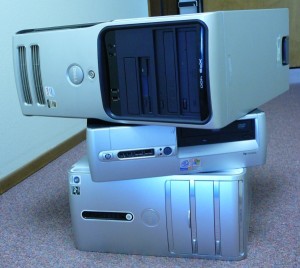When I bought my first computer, I had no idea what I was doing. I did not know what a computer could do for me, or how much I should spend. I now have many years of experience in the computer field. Out of personal need and because many people have asked this question, I have developed a method for buying the perfect computer.
 For you to purchase the “perfect computer” you must consider three distinct concepts: a budget or how much you can afford to spend; a function or what you expect to be able to do; and a package or what components you expect it to have. These concepts are not listed in any particular order because they depend on each other.
For you to purchase the “perfect computer” you must consider three distinct concepts: a budget or how much you can afford to spend; a function or what you expect to be able to do; and a package or what components you expect it to have. These concepts are not listed in any particular order because they depend on each other.
Take for instance that you have a budget in mind. The budget or the cost of the computer will dictate how much computer you can buy. This obviously affects the type of hardware you can buy. And then that affects what you can do with it. If you simply MUST have a specific component, such as a specific amount of memory, then this will dictate what it will cost and what you can do with it.
Let’s get started.
Starting with an example of when a budget is the priority. Buying a computer within a budget works like this:
 Define your budget.For illustrative purposes, say $500 (you can use any amount whatsoever). This method will work with any amount. The budget directly affects what kind of hardware you will get.
Define your budget.For illustrative purposes, say $500 (you can use any amount whatsoever). This method will work with any amount. The budget directly affects what kind of hardware you will get.- Select your hardware.Once you have a budget, shop around and find a few computers that fit your budget. Place them side by side and compare the information. Compare which computer has the higher numbers. What I mean is compare how much memory one has versus the others. Or determine which one has the biggest hard drive. Or which one has the faster processor. The hardware will directly affect what you can do with it.
Select your function.
When you start with a budget, you will buy a computer that can do what the budget can afford. You may be able to apply the function rule to the hardware rule to fine tune your purchase.
When the function is the primary concern instead of the budget, the decision wheel is turned to a different perspective.
- Select your function.
Say you need a computer for graphic design. You will need to gather a list of computers that will be able to meet your function. Also, if you wanted to write a book then all you may need is a computer that will do word processing. The list of hardware will not be that same as if graphic design was your focus. The hardware will be dictated by the function. - Select your hardware.
As you might have expected, you need to go shopping for computers that fit your function. Get the few computers that do the same function together. You probably have noticed that I have not mentioned brands. These computers must have very similar features. All computers must have the same amount of memory, or be as fast and have the same or similar hard drive space. The budget will be dictated by the hardware. - Select your budget.
As stated above your hardware will dictate your budget. The advantage of this process is that you will not overspend for your computer. The reason for this is that all hardware at this stage is the same regardless of monetary value. I would pick the least expensive. You should too.
In conclusion, you can use this decision wheel to get the right computer. The method is simple. Start with the side of the wheel that is most important to you. The important thing is to compare apples to apples (or PCs to PCs) as the case may be.
If you want to spend a lot of money, you can. The right choice will be evident, quick, and very accurate. Have fun with it.

Are there less security issues with Apple software than with Microsoft?
According to my research, no. Both Apple and Microsoft are susceptible to security issues. Apple has had less market share in the past making it a smaller target for security breaches. However, they are growing in popularity and with that, they have become a viable target for perpetrators. Whichever platform you chose, you should consider proper protection in the form of an anti-virus and firewall software.
This has simplified the whole process of purchasing a laptop. Thank you!
I’m glad you got some value out of this article. Let me know how your new computer/laptop hunt goes.
THANK YOU JUAN